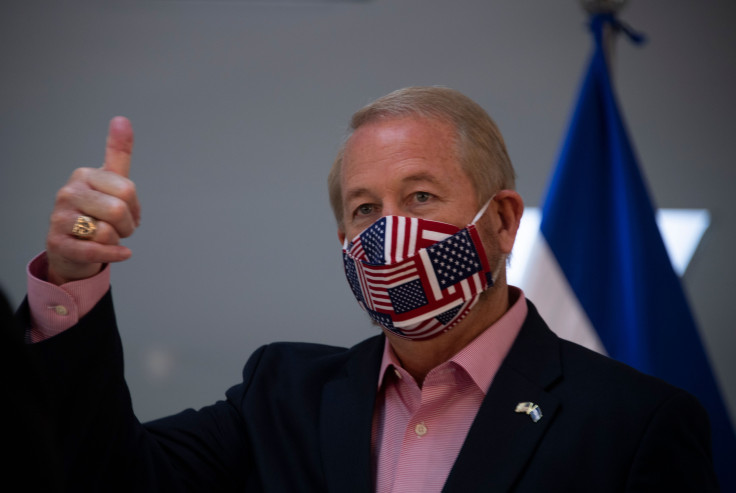
Donald Trump's pick to be the next ambassador to Mexico, Ronald Johnson, is well-acquainted with Latin America. He has decades of experience in the U.S. Military and the CIA, and, most recently, served as the U.S. ambassador to El Salvador, where he cultivated a strong alliance with President Nayib Bukele to combat illegal immigration and crime.
In his announcement, Trump emphasized Johnson's experience and professional achievements, saying he would work "closely with our great Secretary of State Nominee, Marco Rubio, to promote our Nation's security and prosperity through strong America First Foreign Policies."
The President-elect has announced plans to prioritize curbing illegal immigration and drug trafficking from Mexico during his second term—areas where Johnson has extensive experience.
Johnson's Experience as Ambassador to El Salvador
President Trump appointed Johnson as U.S. Ambassador to El Salvador in 2019. During this time, he built a strong relationship with Bukele, whom he has hosted at his Miami home and considers a friend, as evidenced by public posts from Johnson's Cuban-American wife Alina Arias Johnson.
Con la Primera familia de El Salvador en nuestra casa en Miami pic.twitter.com/Tt3drVq9pm
— Alina Arias Johnson (@AlinaJo40093561) November 30, 2021
Bukele also awarded Johnson with the country's highest honors and an award for outstanding diplomatic service.
En 2021, Ronald Johnson, embajador de EE.UU. en El Salvador, fue condecorado por el presidente Bukele con la Orden Nacional José Matías Delgado y la Gran Orden Francisco Morazán, destacando su labor en fortalecer las relaciones entre ambos países. Este reconocimiento resalta su… https://t.co/wy1OW0uwwS pic.twitter.com/jS8Zyk4tAo
— José Luis Morales (@JLMNoticias) December 11, 2024
Involvement in TPS Extension
Notably, in 2019, Johnson worked with Bukele to secure a one-year extension for Salvadoran Temporary Protected Status (TPS) recipients, a designation granted by the U.S. Department of Homeland Security (DHS) that allows eligible individuals to live and work in the United States for a specified period without fear of deportation.
Estamos muy felices de poder anunciar que hoy en Washington D.C. firmamos un acuerdo que extiende el Estatus de Protección Temporal (#TPS) para los salvadoreños que están en EE.UU. por un año más. pic.twitter.com/eTOsU3wHuo
— Jefe de Misión de la Embajada de EE.UU. en E.S. (@USAmbSV) October 28, 2019
Focus on Fighting Crime and Illegal Immigration
In a member profile, the Republican Men's Club highlighted some of Johnson's achievements during his tenure in El Salvador, praising his involvement in the arrest of hundreds of gang members and efforts to curb illegal immigration.
"His persistent engagement with U.S and Salvadoran law enforcement and security entities, affected the arrests of hundreds of gang members, and enabled criminal extraditions to both countries. Violent crime and extortion rates (leading causes of illegal immigration) dropped to their lowest numbers in recorded history. Cooperation on Counter-Narcotics increased significantly."
- Republican Men's Club
Homicides in El Salvador began declining under Bukele's crackdown, with reductions observed during Ronald Johnson's tenure as U.S. ambassador, per Reuters. During his time in the country, homicides dropped from over 2,000 in 2019 to just over 1,000 in both 2020 and 2021.
While Bukele's measures have been widely popular among Salvadorans weary of gang violence, human rights advocates have criticized his administration for alleged arbitrary detentions, torture, and prisoner deaths in custody. However, it is unknown how involved Johnson was in the implementation of Bukele's crime-fighting measures.
Central Intelligence Agency and Military Experience
Jonshon enlisted in the Army National Guard in 1971 and began his military career, which spanned over two decades. He became a Special Forces officer, and held key leadership roles which took him across Central and South America.
#RonaldJohnson, quien será el próximo embajador de #EU en #México, es un ex soldado de fuerzas especiales.
— Rocío Jiménez Mtz. (@rociojimenez15) December 11, 2024
Luchó contra el Frente Farabundo Martí en #ElSalvador en los ochenta y ha operado clandestinamente con la CIA.
No es un burocrata de escritorio, tampoco un político. pic.twitter.com/WNdsHzIVvc
During El Salvador's Civil War, Johnson completed multiple tours as one of 55 U.S. military advisors engaging in combat operations and training Salvadoran forces. The diplomat also directed operations focusing on counter-insurgency, threat mitigation, and conflict resolution. He was later stationed in the Balkans, where he helped capture war criminals.
He retired from the military in 1998 as a Colonel and Green Beret after a 27-year military career and continued his service with the CIA, contributing to global missions and working with U.S. military commands.
Personal Life
Johnson was born in a small town in Alabama and now resides in Miami, Florida, with his wife, Alina Arias Johnson, a Registered Nurse and former Cuban citizen. Married for over 40 years, the couple has four adult children and eight grandchildren, per Johnson's Republican's Men Club profile.
© 2025 Latin Times. All rights reserved. Do not reproduce without permission.





